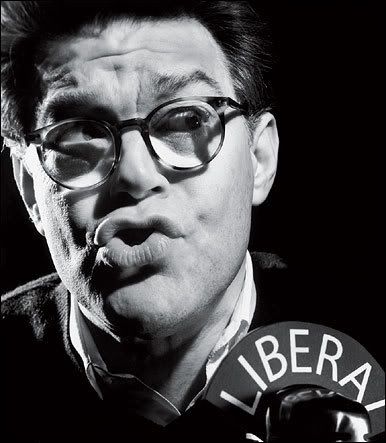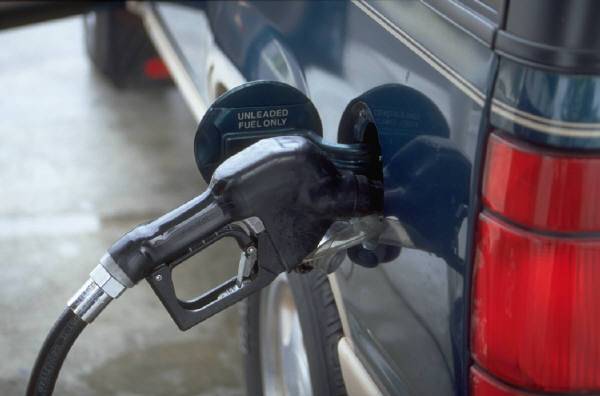The Birth of a Political Mind
We grow up with the politics of our parents. As children, we have no other exposure to political opinions, and so like many things, the voice of our parents amounts to the voice of truth. Our parents may have had well thought out ideas on the nation and the economy, or perhaps they were just repeating what they themselves were taught.
At some point we began to watch the news and read the newspaper, and began forming opinions of our own. These may have mirrored the ideals our parents had, or perhaps not, but regardless they became not our parents' politics but our own.
My father votes Republican (except in 2000, where he voted for Gore). I don't necessarily believe that this is because of any deep held beliefs in the free market or ideas on the role of government vs the individual, but because that's probably what his dad voted. So I grew up in a mildly right-leaning household, and although my mother is pro-choice she also votes to the right. I believe it was as a teenager when I first began thinking about politics. Rush Limbaugh had a TV show then (he still may, for all I know), and I had just gotten a TV in my bedroom. I felt like such a sophisticated teen, watching TV not for pure entertainment, but for ideas as well. I found myself reading the paper more, and I can't say that I was particularly agreeing with Limbaugh or disagreeing. I just knew that his show was occasionally funny (something I probably wouldn't find it today, with his jokes about feminazis and all), and it talked about politics. It was for me what the Daily Show would become later, politics with jokes. I even read a couple of Limbaugh's books.
I believe it was as a teenager when I first began thinking about politics. Rush Limbaugh had a TV show then (he still may, for all I know), and I had just gotten a TV in my bedroom. I felt like such a sophisticated teen, watching TV not for pure entertainment, but for ideas as well. I found myself reading the paper more, and I can't say that I was particularly agreeing with Limbaugh or disagreeing. I just knew that his show was occasionally funny (something I probably wouldn't find it today, with his jokes about feminazis and all), and it talked about politics. It was for me what the Daily Show would become later, politics with jokes. I even read a couple of Limbaugh's books.
Don't worry, the story has a happy ending.
This was the time of Clinton's first term. Remember those good old days? Back then we had a president who was getting things done, our budget deficit was shrinking down into nothing and turning into a surplus, and America was liked and admired around the world (when I visited Europe in 1998, I experienced this first hand. It's great being thought well of just because of where you're born). was the watershed moment when this all changed? I can't pinpoint it exactly, but I'd have to guess it was reading Al Franken's book, Rush Limbaugh Is A Big Fat Idiot. Reading that was a sort of epiphany. Here was a guy that was much, much funnier than Rush (always important for a young mind to be entertained while educated), and whose opinons just seemed to make more sense. I mean, I would hear what Limbaugh had to say, but it never really sank in because it just didn't seem like common sense, but Franken's ideas just seemed logical.
was the watershed moment when this all changed? I can't pinpoint it exactly, but I'd have to guess it was reading Al Franken's book, Rush Limbaugh Is A Big Fat Idiot. Reading that was a sort of epiphany. Here was a guy that was much, much funnier than Rush (always important for a young mind to be entertained while educated), and whose opinons just seemed to make more sense. I mean, I would hear what Limbaugh had to say, but it never really sank in because it just didn't seem like common sense, but Franken's ideas just seemed logical.
That, and he pointed out repeatedly in his book that Limbaugh was not only a compulsive liar and showboat (much like Bill O'Reilly has become), but a big fat idiot as well, an opinion I have not deviated from since.
Common Sense Why all of the nostalgia? I was just thinking about common sense when it comes to politics. There's always bills being passed that escape the public eye, or that we just ignore as Politics As Usual. But last night (Thursday) the Senate passed what I see as being the first really logical bill I've seen in a while.
Why all of the nostalgia? I was just thinking about common sense when it comes to politics. There's always bills being passed that escape the public eye, or that we just ignore as Politics As Usual. But last night (Thursday) the Senate passed what I see as being the first really logical bill I've seen in a while.
Some of the points in the bill:
"--It requires automakers to make a 40 percent increase in the fuel efficiency of their vehicles by 2020 and for the first time puts SUVs, vans and small trucks under the same regulation as passenger cars.
Under the bill each vehicle group must achieve a 10 mpg increase in fuel economy by 2020 with an overall average requirement for a manufacturer's fleet increasing to 35 mpg. Currently cars must meet a fleet average of 27.5 mpg; light trucks — including SUVs and vans — must achieve an average of 22.2 mpg.
Congress last passed a federal auto fuel economy standard in 1975 and the current requirement for cars of 27.5 mpg has not changed since 1989.
--Price gouging provisions that make it unlawful to charge an "unconscionably excessive" price for oil products, including gasoline. It also gives the federal government new authority to investigate oil industry market manipulation.
--New appliance and lighting efficiency standards and a requirement that the federal government accelerate use of more efficient lighting in public buildings.
--Grants, loan guarantees and other assistance to promote research into fuel-efficient vehicles, including hybrids, advanced diesel and battery technologies" (from the AP).
The bill wasn't perfect.
"--Republicans also blocked another central goal, known as the Renewable Portfolio Standard, that would have required electric utilities to produce at least 15 percent of their power from renewable fuels by the year 2020."
There are a lot of things the the Republicans voted down. Most importantly, while the bill calls for more renewable resources to be developed and used, it provides no tax breaks to do so. No tax breaks means limited corporate involvement, and no corporations means that it's still on the backs of the entrepreneurs. With an undertaking as massive as that of the nation's energy needs, at some point Big Business is going to have to get involved. Personally, i don't see why they don't.
The Con:
--A crapload of money needs to be spent in R&D on renewable energy sources. I'm aware of this. But...
The Pro:
--Energy that is FREE. They won't have to drill for oil or mine for coal once they get the technology. At some point it merely becomes about maintenance, and they can still charge people for a power bill and make lots and lots of money without having to spend it.
It all comes down to common sense. The fuel efficiency laws haven't been changed for three decades. With all of our technological advances, what does this make you think of?
Who benefits from low fuel economy standards? Just think about it for a moment. There are a few people who this helps. The oil industry. Gas station owners. Bribe taking politicians (both parties). For everyone else it means more environmental destruction, a further drain on the earth's oil reserves, and more money out of our pockets. So this isn't just something that affects the treehuggers and their endangered wildlife, but the pocketbooks of the right, too, which is something that they understand. Why wouldn't we want this?
Why wouldn't we want this?
Why haven't things been changed? Because in the philosophy of the right, the market will adjust to the desires of the consumers, right? Well, if the market compensates for itself, it only does so after it has destroyed its supply. No supply, no demand, and eventually the oil tycoons (including the Bush family, surprise surprise) will be gagging on the toxic air that pollution has caused, and huddling in caves with the rest of us, because they've made such a good effort at blocking attempts at developing and promoting cleaner alternative sources of energy. They're screwing their children and grandchildren, too.
It all comes back to what makes sense. It makes sense for cars to be as fuel efficient as technology will allow. It makes sense to develop alternative energy sources, clean ones. Doesn't it?
Doesn't it?
One More Thing Bush's approval rating has slipped to 26%. I just want to quote from Newsweek, because this is too good.
Bush's approval rating has slipped to 26%. I just want to quote from Newsweek, because this is too good.
June 21, 2007 - In 19 months, George W. Bush will leave the White House for the last time. The latest NEWSWEEK Poll suggests that he faces a steep climb if he hopes to coax the country back to his side before he goes. In the new poll, conducted Monday and Tuesday nights, President Bush’s approval rating has reached a record low. Only 26 percent of Americans, just over one in four, approve of the job the 43rd president is doing; while, a record 65 percent disapprove, including nearly a third of Republicans.
The new numbers—a 2 point drop from the last NEWSWEEK Poll at the beginning of May—are statistically unchanged, given the poll’s 4 point margin of error. But the 26 percent rating puts Bush lower than Jimmy Carter, who sunk to his nadir of 28 percent in a Gallup poll in June 1979. In fact, the only president in the last 35 years to score lower than Bush is Richard Nixon. Nixon’s approval rating tumbled to 23 percent in January 1974, seven months before his resignation over the botched Watergate break-in.
When I mean good, I don't mean that I like the fact that we are all suffering from under a President we seem to generally dislike. I'm just glad that even the Republicans are looking around and wondering what the hell is going on.
Okay, One MORE Thing
How many branches of government do we have? I always thought it was three, but Keith Olbermann pointed out that there are in fact four, Legislative, Judicial, Executive, and The Dick.
Cheney has declared himself as not a part of the executive branch. Really. I'm not making this up (a statement I've become accustomed to making over and over again during the Bush reign of terror).
From Countdown, 6/21/07
22 June 2007
What Makes Sense
Posted by
The Idea Of Progress
at
12:07 PM
![]()
Labels: al franken, approval, bill, Bush, cheney, countdown, energy, environmental, fuel efficiency, government, Olbermann, politics, republican, rush limbaugh, senate, video
Subscribe to:
Post Comments (Atom)




No comments:
Post a Comment